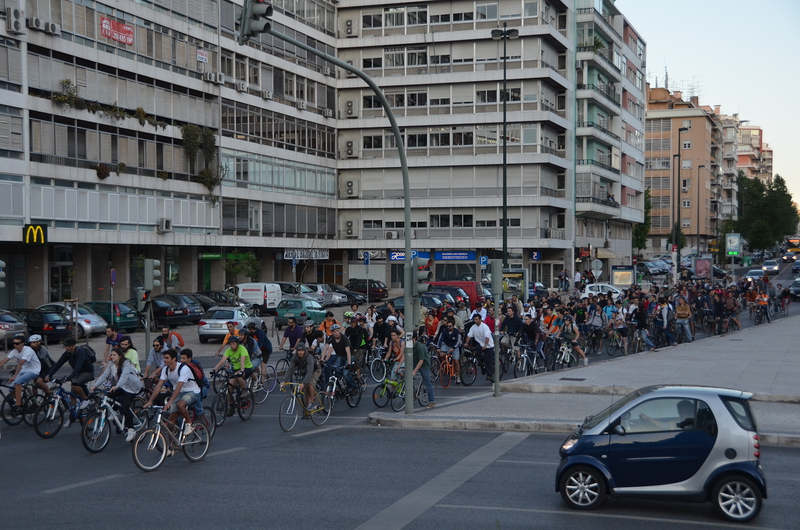
Portuguese Government Invests in University Bicycle Lending
The Portuguese government has launched a €6.4 million long term bicycle-lending program in 17 universities, covering different parts of the country’s mainland. Conventional and electrically assisted bicycles will be lent to students as part of a program to start a boost current bicycle use in the country’s mobility system, currently with a mode share below 1%, but aiming to achieve 5% by 2020.
This first program, named U-Bike was developed by the Ministry of Environment and Mobility over the last year, focussing on higher level education students, covering a population of 200,000 university students with over 3,300 bicycles to be distributed amongst the 17 participating universities. Besides the long-term bike lending scheme, bicycle parking will be increased and/or improved at all participating universities. The idea is to lend bicycles to university students which are to use these as their main mode of transport on for daily travel to/from the faculty and for other daily errands and trips. Approximately two thirds of the bicycles will be electrically assisted, so as to promote bicycle use amongst population segments who wouldn’t normally consider cycling as a travel option, and as a way to change travel habits at an age which will hopefully last into later years when students enter the work force, according to José Mendes, Secretary of State of the Environment, in an interview to the Lisbon based online newspaper Observador.
 One of the participating institutions, for example, is the University of Aveiro, which applied for the program as part of its Low-Carbon Campus strategy. 239 bicycles will be provided to students who apply (142 conventional and 92 electrically assisted), and the university’s parking facilities will be doubled from 300 to 600 racks, plus two new covered bicycle parking shelters, all part of the same package.
One of the participating institutions, for example, is the University of Aveiro, which applied for the program as part of its Low-Carbon Campus strategy. 239 bicycles will be provided to students who apply (142 conventional and 92 electrically assisted), and the university’s parking facilities will be doubled from 300 to 600 racks, plus two new covered bicycle parking shelters, all part of the same package.
Part of a Broader Commitment to Reduce Greenhouse Gas Emissions
The Portuguese Government’s focus isn’t only on improving mobility behavior amongst a trend-setting population segment –university students- but it’s especially focusing on reducing Greenhouse Gas (GHG) emissions at a national level.
Portugal is one of the world’s best performers in renewable energy production and distribution, with an advanced policy second to none, fully non-nuclear and the first country to run 4 days straight on renewable electricity. Despite and due to this outstanding position, 70% of the national GHG emissions come from the country’s urban mobility system. As a forerunner in the decarbonisation of Europe’s power grid, it is sustainable mobility in urban areas that is currently Portugal’s greatest decarbonisation challenge. As such it’s no surprise José Mendes mentions to Observador, that there will be a strong launch of soft-mobility in Portugal.
Besides the U-Bike program, the Portuguese government has launched two other important nationwide programs available to all of the nation’s 308 municipalities addressing bicycle mobility, namely the Strategic Urban Development Programs (PEDU’s) and the Sustainable Urban Mobility Action Plans (PAMU’s) integrated in the Portugal 2020 program. As a third measure, the shelved national bicycle mobility plan Ciclando is to be updated and relaunched soon, but an exact date has yet to be disclosed.

In any case, during the current year some achievements will already be visible, as some important cities have already anticipated these measures, with important pro-cycle mobility policies being implemented throughout the country, most notably at Murtosa and the Aveiro region, but also in the largest city Lisbon, and the second-largest Porto, as well many metro area suburbs of both the largest cities, district capitals, and various coastal areas, especially in the Algarve and the Centre-North of the country. The work of various non-governmental associations and citizens, and events such as the monthly Critical Mass bike rides have been an interesting indicator as a growing number of people are putting the pressure on local governments to include bicycle mobility in local policy. The Mega-Massa Crítica to be held on June 24th between pro-bicycle Lisbon and neighbouring car-centred Oeiras municipality is a good example of what's happening.
Regions:
News category:
Topics:
Contact the author
Recent news!
Upcoming events
Contact Us
Avenue des Arts, 7-8
Postal address: Rue de la Charité, 22
1210 Brussels, Belgium









